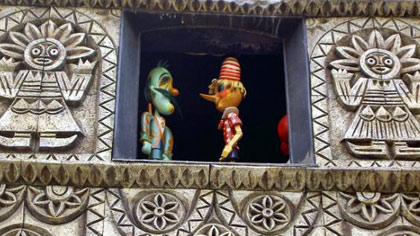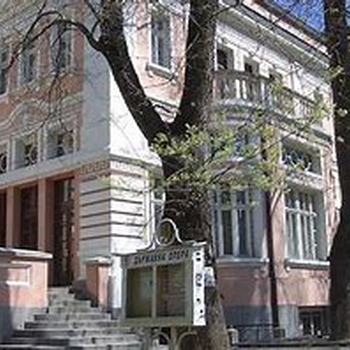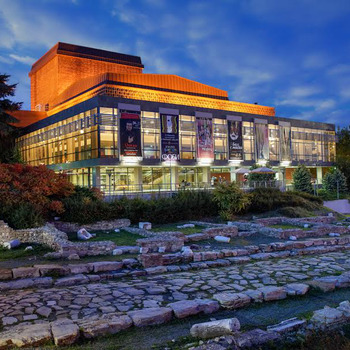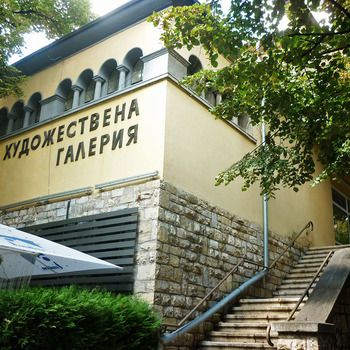State Puppet Theater
Overview
The Stara Zagora Puppet Theater has its own original politics and aesthetics. The Puppet Theater in Stara Zagora was founded in 1957. Without specialized academic education, only with a naturally suggested attitude to such art and cultural idealism, the theater gathers several young people with different professions - Kosta Valkov, Denka Dimova, Lydia Alexandrova, Marin Pavlov, Katya Zagorova, Dobrina Bunardzhieva and Dobrina Vasileva. With a lot of work and perseverance, they learn the specific language of the doll and speak it in a confident voice. The founder and first director of the theater is Petar Dobchev. Peter Alexandrov was the first director. The first show is called "Winnie the Tourist".
On January 1, 1962, the theater became state-owned. The cast is joined by artists Mariana Hristova, Alexander Temelkov, Georgi Monev, Zdravko Kalpakchiev-Ziko, Anastasia Lukanova, Zdravka Mihailova. The director Maria Yankova makes a special contribution to the development of the Stara Zagora Puppet Theater. From 1957 to 1965, the director of the theater was Petar Dobchev, and from 1965 to 1968 the director was Lydia Ventsislavova.
A puppet department was established at the National Academy of Theater and Film Arts and his first graduate, Antoaneta Botusharova, entered the Puppet Theater of Stara Zagora. The puppet set designer Veselin Nedelchev, who is deservedly called "the Bulgarian father Carlo", also started working in the theater. Vasil Apostolov was the director and director of the theater from 1968 to 1982. He turned the Stara Zagora Puppet Theater into a truly professional theater. On the site of the old community center, Apostolov built a modern children's cultural center with a modern stage, hall, sound and lighting equipment, cheerful children's pastry shop, singing clock with dolls and dancing Piero in front of the entrance, the work of another great artist in the theater - sculpture Emil Ivanov. After Apostolov's resignation in 1982, Lyubomir Tsakev became the director of the theater, who retired in 1996 due to illness and Emil Ivanov became a director of sculpture in his place for two years.
Since 1998 the director of the theater is Darin Petkov. Today the theater has an extremely young ensemble. His repertoire is filled with many titles of plays for children and adults. The theater is a leader and enjoys exceptional national and international prestige.
State Puppet Theater - Stara Zagora is a repertoire theater of state funding. More than 300 productions by Bulgarian and world authors writing for children and adults are staged on its stage.
It has its own building, stages / main and summer / and studios, which allows it to effectively plan its activities. The theater is a leader among puppet theaters in terms of artistic and financial results.
State Puppet Theater - Stara Zagora hosts the International Puppet - Theater Festival for Adults "PIERO". The organizers of the festival are: the Municipality of Stara Zagora, the Ministry of Culture, the non-profit association "Piero" and the State Puppet Theater - Stara Zagora. The festival has been awarded the European label for significance EFFE 2017-2018 and EFFE 2017-2018, which is a pride, but also a huge responsibility.
The festival program is a synthesis of puppet shows for adults, workshops, theoretical seminars on art management, cinema panorama of animated films, distribution of guest performances in the region, exhibitions of paintings, cartoons, sculptures, concerts.
The State Puppet Theater - Stara Zagora has as its distinctive competence the organization and holding of the International Creative Laboratory - studio. The international creative laboratories in Puppet Theater - Stara Zagora started in 2003. They are held as a biennial. The laboratory is designed for young directors, actors, set designers, playwrights and anyone who wants to improve and expand their creative tools in the field of adult puppetry.
Recommended
- Ancient Forum of Augustus Trajan
- Hall of Laughter
- Zoo
- Bedechka Park
- Neolithic dwellings Museum
- Archaeological complex "Museum of Religions"


 Bulgarian
Bulgarian Romanian
Romanian




